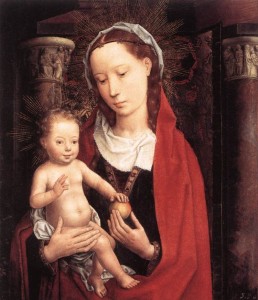evangelical apologists take note: Hurtado on Jesus and God
“…in the New Testament Jesus is not worshiped ‘as God’ (whatever that may mean) but, instead, with reference to God, as the Son of God, as the Lord appointed by God…”
“…in the New Testament Jesus is not worshiped ‘as God’ (whatever that may mean) but, instead, with reference to God, as the Son of God, as the Lord appointed by God…”
Dr. Hurtado explains the term “early high christology” and what it means when applied to his own work.
Here. On the whole, a well done piece. Craig is indeed a fearsome debater, and a bold and insightful scholar. His devotion to apologetics makes him a bit uncool among professional philosophers. But I would guess that his work is probably read by more average people – Christians, atheists, Muslims, and who-knows-what – than any living philosopher. The reason is that it has many good… Read More »William Lane Craig in the Chronicle of Higher Education
While there have long been standard terms and sentences relating to the Trinity, there is not and has never been any clear consensus about how to understand those terms and sentences. There is agreement about what the sentences do or don’t imply (Tritheism? No. Monotheism? Yes. Ontological inequalities between the three? No.) But there is not an interpretation of the sentences themselves which is held… Read More »10 steps towards getting less confused about the Trinity – #9 – Formulas vs. Interpretations
Thinking about Trinity in grad school, reading Richard Swinburne’s The Christian God.
Some critical thinking about Craig’s Trinity theories: his Trinity monotheism and his minimal tripersonal monotheism.
Is God’s spirit in the New Testament supposed to be a self in addition to God and his Son?
Can these obvious truths pop the bubbles of various theological and christological speculations?
What happened after the famous council at Nicea in 325? Was there rejoicing and peace, now that the “Arian” controversy had been definitively settled? Sadly, no.
 Let’s pretend that this shows Jesus at the age of 3 months. Does the New Testament teach that no more than 12 months before, Jesus came into existence (for the first time), that is, in philosopher’s lingo, that he was generated?
Let’s pretend that this shows Jesus at the age of 3 months. Does the New Testament teach that no more than 12 months before, Jesus came into existence (for the first time), that is, in philosopher’s lingo, that he was generated?
Sir Anthony Buzzard has argued that the New Testament teaches exactly that, and explicitly so. There’s been a boiling discussion of this argument by our intrepid commenters on this post.
I think this issue deserves some posts. In the past I’ve never been sure I’ve quite understood his argument, and so have never taken a position on it. I’m going to think through it in this series of posts.
Let us first note that the truth and reasonableness of this humanitarian unitarian christology doesn’t stand or fall with this exegetical argument. There may be other textual, theological, or philosophical reasons to hold that Christ did not exist before his human life, i.e. before his conception. It is clear to me, in fact, that this argument is not Sir Anthony’s only reason for this view. (See e.g. comment #2 in the discussion linked above.)
Second, let’s note that it is a very strong or bold argument. Read More »Buzzard’s textual arguments against Jesus’ pre-human existence – Part 1
V.V. Raman is an emeritus professor of Physics at the Rochester Institute of technology, and has written a number of works on science and religion, his Indian heritage, and other subjects relating to the history of science, and the relation of the sciences to the humanities. Also, he’s a poet. Watch his interview by Dr. Robert Lawrence Kuhn here (click the blue button) and read… Read More »Is God a Self? Part 5 – Varadaraja V. Raman
 At long last, we’ve reached the 25th and last chapter of book three of Richard of St. Victor’s De Trinitate! (Here are the other Richard-related posts here @ trinities.)
At long last, we’ve reached the 25th and last chapter of book three of Richard of St. Victor’s De Trinitate! (Here are the other Richard-related posts here @ trinities.)
Richard starts off with the point that for the Persons of the Trinity, unlike the case of any other persons, there is “individuality without plurality” – each is what it is without any plurality of any kind – and “unity without inequality” – I’m not sure what he means by this second phrase. (p. 396)
In contrast, any other person, such as you or me, can be “unequal to himself”, in that we can become greater or lesser over time. (e.g. I’m smarter and morally better now than when I was 14.) And persons like us have multiple properties (we’re not simple). (p. 396) And of a human person, say Barak Obama, we can say that “his power alone is dissimilar to itself… [since] one thing is easy for him, another is difficult and a third is impossible.” (p. 397)
Then he says, “one and the same nature… in one respect is less, in another it is greater, and [so is]… dissimilar and unequal to itself.” (p. 397) So, the same point he made about persons, can also be made about natures. Thus,Read More »Richard of St. Victor’s De Trinitate, Ch. 25 (Dale)

— “Daddy, why do trees branch out?”
— “So you can climb in them, Jimmy.”
Patristic scholars tell us that the doctrine of the trinity was really developed in the 4th century. The question is: what exactly is the ‘development’? If you read many of those scholarly big books on patristic theology, you’ll occasionally come across the idea that there were two major theories of the trinity floating around in the 4th century: the ‘derivation view’ and the ‘generic view’. But what exactly are these two views, and who held them?Read More »Derivation vs. Generic Theories — part 1 (JT)
William Lane Craig is a respected and extremely prolific Christian philosopher. I’d give you his c.v., but it might bring the internet to a standstill. He’s sometimes a bit pugnacious in print, but is very amiable in person. And he’s extremely sharp. His trinitarian co-theorizer, J.P. Moreland, is also influential and inhumanly prolific, and is one of the clearest, best organized writers around. He’s been called a “scrappy” arguer, which is apt, and he’s also a swell guy (I took classes from him at Biola in the early 90s, and I’m grateful for how he influenced me). A Willardite, he also writes books about Christian spirituality, such as this good one. Both Craig and Moreland are well known for their many forays into the popular area, in the form of books on apologetics, public debates and such.

Nice doggie… nice doggie… What’s Cerberus here got to do with the Trinity? Keep reading.
Read More »Moreland’s and Craig’s “Trinity Monotheism” – Part 1
My posting has been infrequent lately. That’s because I’ve been working on an old paper of mine which isn’t on philosophical theology. But it’s also because I’ve been working on a couple of very exciting blog-related things behind the scenes – stay tuned.
My recent exchange with Brandon Watson got me to thinking. This is going to be boringly methodological, but I need to think about this issue, as it’ll come up again and again. As a philosopher, I’m interested in evaluating theories on their merits – consistency, fit with the evidence, coherence with what else we believe, explanatory power, and so on. When I look at the history of theological debate, it is very often marred with the ugly weapons of rhetoric Read More »Some thoughts on labeling others’ theories
Does John start his gospel at the same “beginning” as Mark 1:1?
“Of myself, I can do nothing.” Is this claim about Jesus’s self/person, or only about his “human nature”?
 The Clarke-Waterland duel went on for many, many pages in several books, getting increasingly snippy.
The Clarke-Waterland duel went on for many, many pages in several books, getting increasingly snippy.
Last time I said that I thought Waterland was a social-mysterian-trinitarian. But I’m not so sure about the “social” part! He’s very unclear on whether the “Persons” are selves. They’re different somethings, in any case. But in this series, I’m sticking to an exegetical issue.
Here are excerpts of Waterland’s second salvo about the “only God” texts.
[Clarke] had produced John 17:3, 1 Cor. 8:6, Eph. 4:6, which prove that the Father is styled, sometimes, the one God, or only true God; and that he is the God of the Jews, of Abraham, etc. I asked how those texts proved that the Son was not? You say… “very plainly… Can the Son of the God of Abraham (Acts 3:13) be himself that God of Abraham, who glorified his Son?” But why must you here talk of that God, as if it were in opposition to this God, supposing two Gods; that is, supposing the thing is question. …I tell you that this divine Person is not that divine Person, and yet both are one God… (A Second Vindication of Christ’s Divinity in Waterland’s Vindications of Christ’s Divinity, 422-3, original italics, bold added, punctuation slightly modernized)
This is wheel-spinning. Clarke does, and Waterland does not take the passages in question to identity (assert to be numerically identical) the Father and Yahweh.
Clarke had asked whether Waterland thought that the term “Father” in these texts actually includes, i.e. refers to, the Son as well. Waterland clarifies,Read More »DANIEL WATERLAND ON “THE FATHER IS THE ONLY GOD” TEXTS – PART 2